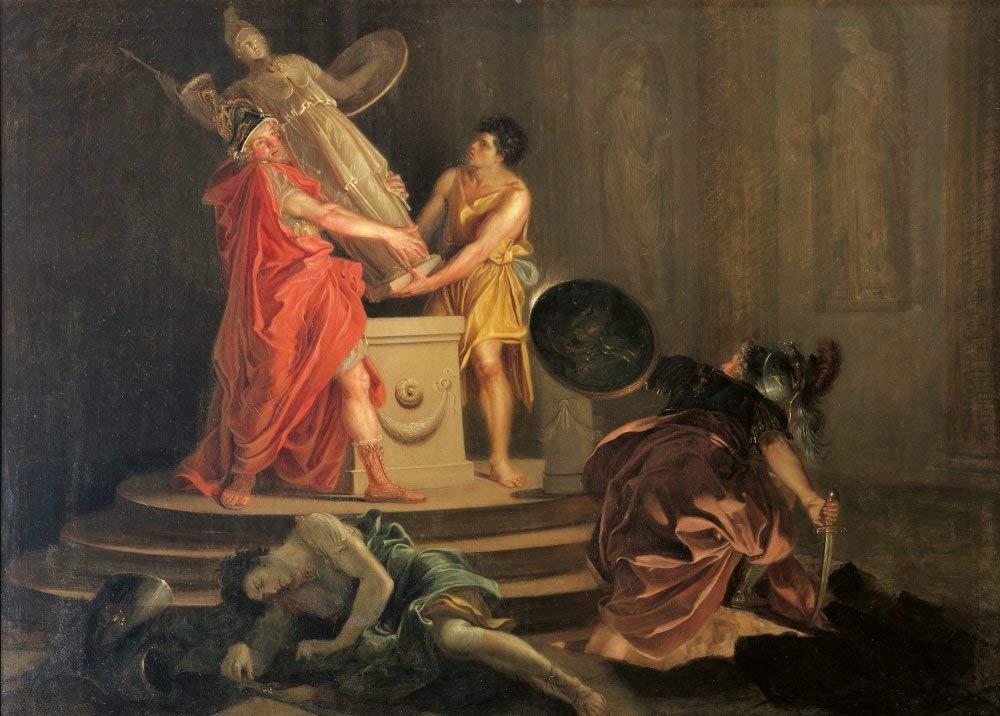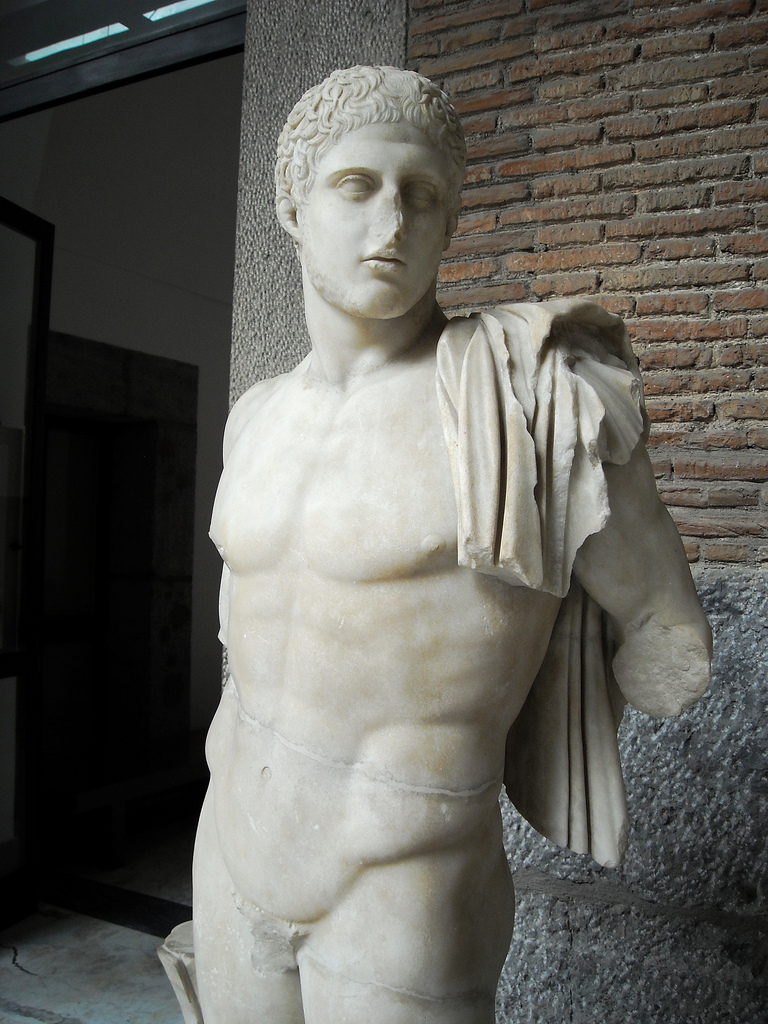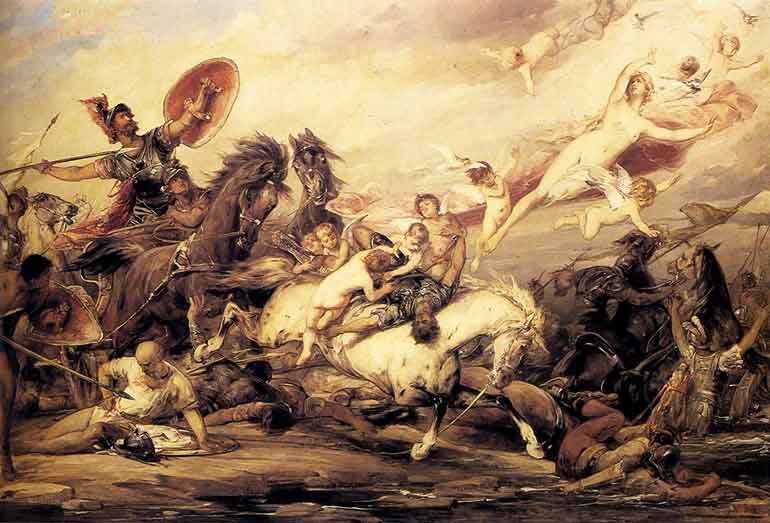Diomedes
The Argive hero and great warrior of the Trojan War.

As the King of Argos and a healer of Helen, Diomedes contributed decisively to the Greek victory in the Trojan War. His importance was partly due to his prowess as a warrior but also as a result of his intelligence, a virtue shared with his partner Odysseus.
He was the son of Tidea and Dimipyle, who was the daughter of the king of Argos Adrastos. Tideas, when he first reigned in Aetolia, later took over the kingdom of Argos. So Diomedes was born and reigned in Argos.
There is the opinion that he was the mightiest Achaeus after Achilles. He had taken part in the Epigonian campaign, where he was distinguished for his generosity. He also campaigned against Calydon. In the Trojan War he took part with eighty boats and warriors from Argos. The battle was terrible. Even the god Mars and the goddess Aphrodite wounded, with the help of the goddess Athena, who was his patron. He had worked with Odysseus in many successful businesses. Together, they stole the Palladius from the temple of Ilion, for there was the belief that this was the only way Troy was to take over.

After the Achaeans occupied the city, Diomedes returned to Argos within four days. There, however, he found that his wife, Aegialia (or Aegiali) had not been faithful to him. So he abandoned Argos and fled to Apulia, Italy. There he remarried and founded his own kingdom.
Diomedes in many parts of Greece was worshiped as a hero.
Diomidis' grandfather was Oineas, the king of the city of Kalydonas in central Greece. Her father, Tydeus, had been forced to leave Calydon when he killed a relative, probably his uncle or brother. In Argos he married Dimipyle, daughter of King Adrastos, with whom Diomedes made. The fate of Tydeau was identified with that of Polinyikis, the son of Theban king Oedipus, who had also left his homeland for Argos where he married a daughter of Adrastos. Tydeas supported Polinyikis in his attempt to occupy the throne of Thebes by his brother Eteocles.
Like his father, so Diomedes was a brave warrior. Ten years after Tydea's death, he participated in an alliance named Epigoni, who swore to succeed where their fathers failed to occupy Thebes. The Epigonos fulfilled their oath and installed the son of Polyneiki on the throne. Diomedes also avenged the exile of his father from Calydon. He killed his cousins, who had usurped the throne of King Oeine, and made the son of Oinas the king. But the greatest successes in the battle to Diomedes was the Trojan War, the ten-year conflict between the Greeks (Achaeans) and Trojans, which began when the Trojan Prigkipas Paris abducted Helen, wife of Spartan King Menelaus. As one of many prospective suitors of Helen, Diomedes had vowed to defend the honor that any married so led a fleet of eighty ships with an army against Troy.

Before even reaching Troy, Diomedes and Odysseus visited the kingdom of Lykomedes, where Thetis had brought her son Achilles a young girl dressed to hide between the king's daughters and to avoid the war. Odysseus thought to portray the itinerant merchant who sold cloths and toiletries. Along with the products, he had placed some weapons, which Achilles only showed interest in. So it was revealed to Odysseus and Diomedes. (See picture)
Diomedes was one of the greatest Greek troops of the Trojan War. In the Iliad, Homer considers Achilles his best, and often refers to him as "Diomedes with the terrible war cry". In some cases, Diomedes proves to be brighter than Achilles, when he is away from the battle because of Vrizides and nearly cost the defeat to the Greeks.
Diomedes killed many Trojans in the battle and with the help of the goddess Athena managed to injure both gods. One was Aphrodite, who had intervened to save her son, the Trojan hero Aeneas, from Diomedes' violent attack. In the same fight, Diomedes fought with Hector, his brother, Paris, and his brother-in-law Mars. Athena helped Diomedes force his spear on Mars, wounding the god and forcing him to leave the battle.
The innate intelligence and his companionship with Odysseus had an even greater impact on the outcome of the war. In two cases, in particular, the team's ability to deceive the enemy is described. In the first incident they cheated the Hermian Philoktitis to deliver his magic bow and arrows, which he had inherited from Hercules. These weapons allowed the Greeks to fulfill a prophecy that they would only defeat the Trojans.

In another case, Diomedes and Odysseus performed another plan, the theft of Palladios, a wooden statuette of Athena, through Troy. Both Greeks and Trojans believed that as long as Palladius remained within its walls, Troy would be safe. But they were disguised as beggars, went unnoticed in the city and stole the statuette. These stories highlight the importance of sacred objects on the moral side that held them.
When Diomedes returned to Argos after the end of the Trojan War, he did not receive a hero’s welcome. On the contrary, he discovered that his wife was not faithful to him and in his absence his right to the throne was questioned. It is said that this is due to the Greek Prince Oiaka, who believed that Palamidis' brother was assassinated by Diomedes and Odysseus. So Oiax told his wife Diomedes that her husband returned from Troy with a new mistress. This myth may have inspired the medieval history of Trollos and Chrysidas, which was later narrated by Jeffrey Chasser and then by William Shakespeare. In the first version, the son of King Priamos, Troilos, fell in love with Chryssidas, but then hurts him when he shows his preference for Diomedes. Other sources report that Diomidis' bad luck is due to the injury he caused to Aphrodite, who wanted to avenge him.
Diomedes finally left Greece and resorted to Italy, but there are various versions of what he did there. Some say he was killed by the king of Apulia. Others argue that he founded several Italian cities, including Brindisi and Arpi. According to the Greek poet Pindar, Athena made Diomedes god.